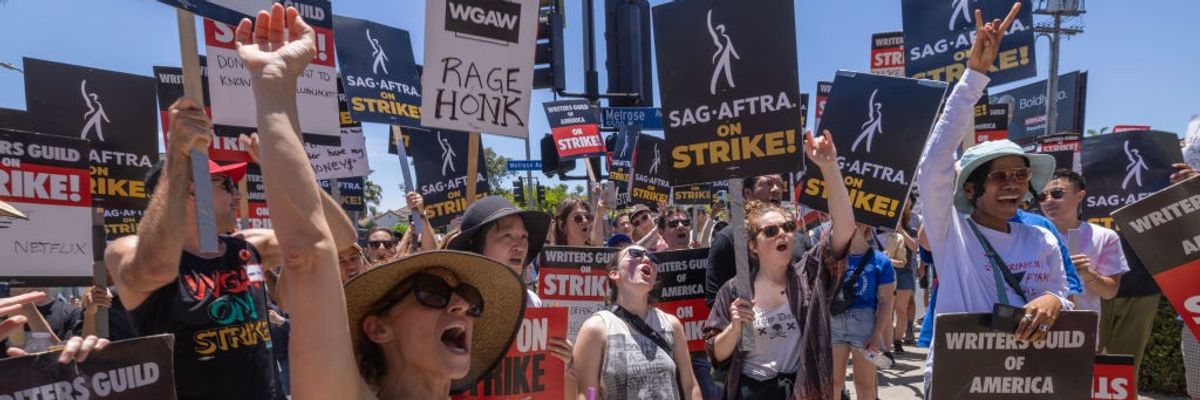We are in an unprecedented moment in history for the modern American labor movement, with widespread labor strikes that stretch from coast to coast. From machinists to movie stars, worker-led actions are reverberating across sectors and sending a powerful message: Workers demand more.
Right now, more than 170,000 media professionals and writers are on strike demanding fair compensation from the Alliance of Motion Picture and Television Producers, and there are 146,000 workers represented by the United Auto Workers (UAW) ready to strike on September 15 if the Big Three American automakers (Ford, General Motors, and Stellantis) fail to improve working conditions and compensation. A strike by the UAW would increase the number of American workers on strike to the highest level since 1983. The scale of these strikes represents a significant shift in labor relations and a unique opportunity to shape an economic future that values and respects the dignity of work and the rights of workers.
For the first time in decades, the public is overwhelmingly on the side of workers. According to Gallup surveys, public support for labor unions is at its highest level in nearly 60 years. This surge in approval signals a significant societal shift and an awakening to the reality of working conditions in a 21st-century economy that often prioritizes profit over people.
Today’s labor movement, emboldened by a call for solidarity, represents a watershed moment for the advocacy and protection of workers’ rights.
Historically, labor unions have been instrumental in securing essential rights and protections for workers, from a five-day workweek to safer working conditions.
Today’s labor movement, emboldened by a call for solidarity, represents a watershed moment for the advocacy and protection of workers’ rights.
Yet, while public sentiment may be evolving, policy and legislation have been slower to catch up. A fair and thriving society needs laws protecting labor that keep pace with the changing workplace landscape. The recent wave of technological innovations, the Covid-19 pandemic, and rising global temperatures are all reshaping how we work, and policymakers must rise to the occasion. In an era marked by increasing employer power over workers and the growing prevalence of precarious work, policies that strengthen the right to strike and to collective bargaining are more critical than ever.
After years of corporate attacks, current labor policies do not respect and promote the collective power of workers. Rather, they enable harmful practices like union-busting, wage theft, and even corporate exploitation of children. Enacting laws that promote labor protections is not just a matter of economic justice—it is a question of human dignity. The right to fair compensation for work, to safe conditions, and to collective bargaining are cornerstones of a just society.
This is the moment for policymakers to demonstrate leadership and act in the best interest of the workers who keep our economy and our society functioning. It is a pivotal opportunity to strengthen labor laws, protect the right to strike and bargain collectively, and, ultimately, pave the way for a more equitable and fair society. The labor reforms available are wide-ranging: Policymakers can end at-will employment, support sectoral bargaining, center workers in workforce development, and raise the decision-making power of workers and unions.
The resurgence of the labor movement is not a temporary disruption to be weathered; it’s a clarion call for change to be embraced. Let’s ensure that this watershed moment in labor history leads to lasting change for the millions of workers who deserve nothing less.

